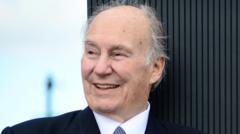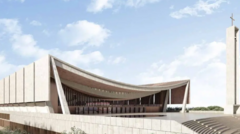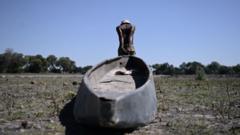Elba emphasizes the importance of Africans telling their own stories and aims to establish film studios in Tanzania and Ghana.
Idris Elba's Vision: Relocating to Africa to Boost the Film Industry

Idris Elba's Vision: Relocating to Africa to Boost the Film Industry
British actor Idris Elba shares plans to move to Africa within the next ten years to support its burgeoning movie sector.
Idris Elba, the renowned British actor famous for roles in series like The Wire, has expressed his intention to relocate to Africa within the next decade. In a conversation with the BBC, the 52-year-old star revealed his desire to actively support the continent's flourishing film industry, thereby empowering Africans to tell their own stories.
Elba, whose mother hails from Ghana and father from Sierra Leone, has a deep-rooted connection to Africa, which fuels his aspiration to help grow the film business on the continent. He is currently involved in plans to build a film studio on Tanzania's tropical Zanzibar islands and another in Ghana's capital, Accra.
In his interview on the sidelines of a cinema industry meeting in Accra, Elba affirmed, "I would certainly consider settling down here; not even consider, it’s going to happen." He aims to move within the next five to ten years and believes that being physically present in Africa is crucial for his mission. "I won’t be able to do that from overseas. I need to be in-country,” he stated. However, reflecting his Pan-African values, he mentioned he will not confine himself to a specific location, saying, "I’m going to live in Accra, I’m going to live in Freetown and Zanzibar."
A significant ambition for Elba is to produce a film using the studio he plans to establish in Accra. He believes it is essential for Africans to take the lead in every facet of filmmaking—acting, directing, financing, and distribution. Elba envisions a future where global audiences better understand the continent in the same way they recognize cities in the US such as New York and Los Angeles.
"This sector is a soft power, not just across Ghana but across Africa," he noted. Elba criticized the negative stereotypes often painted in international representations of Africa, focusing mainly on themes of trauma and colonization. He insists that it is vital for Africans to own the narratives surrounding their culture and languages.
With Nigeria's Nollywood being a dominant force in film production, exporting hundreds of titles yearly, and other traditions in Francophone Africa producing high-quality films, Elba sees immense potential yet to be fully realized. Although he acknowledges the existing talent in African cinema, he points to inadequate facilities as a barrier to success. A UNESCO report from 2022 validated his concerns about challenges facing the industry, including piracy and insufficient training.
Elba advocates for government involvement and investment in Africa’s storytelling capabilities to foster a self-sustaining creative ecosystem. "When you see me, you see a little version of yourself and that encourages us," he concluded, emphasizing the importance of representation and ownership in African filmmaking.
Elba, whose mother hails from Ghana and father from Sierra Leone, has a deep-rooted connection to Africa, which fuels his aspiration to help grow the film business on the continent. He is currently involved in plans to build a film studio on Tanzania's tropical Zanzibar islands and another in Ghana's capital, Accra.
In his interview on the sidelines of a cinema industry meeting in Accra, Elba affirmed, "I would certainly consider settling down here; not even consider, it’s going to happen." He aims to move within the next five to ten years and believes that being physically present in Africa is crucial for his mission. "I won’t be able to do that from overseas. I need to be in-country,” he stated. However, reflecting his Pan-African values, he mentioned he will not confine himself to a specific location, saying, "I’m going to live in Accra, I’m going to live in Freetown and Zanzibar."
A significant ambition for Elba is to produce a film using the studio he plans to establish in Accra. He believes it is essential for Africans to take the lead in every facet of filmmaking—acting, directing, financing, and distribution. Elba envisions a future where global audiences better understand the continent in the same way they recognize cities in the US such as New York and Los Angeles.
"This sector is a soft power, not just across Ghana but across Africa," he noted. Elba criticized the negative stereotypes often painted in international representations of Africa, focusing mainly on themes of trauma and colonization. He insists that it is vital for Africans to own the narratives surrounding their culture and languages.
With Nigeria's Nollywood being a dominant force in film production, exporting hundreds of titles yearly, and other traditions in Francophone Africa producing high-quality films, Elba sees immense potential yet to be fully realized. Although he acknowledges the existing talent in African cinema, he points to inadequate facilities as a barrier to success. A UNESCO report from 2022 validated his concerns about challenges facing the industry, including piracy and insufficient training.
Elba advocates for government involvement and investment in Africa’s storytelling capabilities to foster a self-sustaining creative ecosystem. "When you see me, you see a little version of yourself and that encourages us," he concluded, emphasizing the importance of representation and ownership in African filmmaking.





















